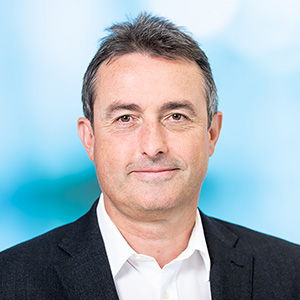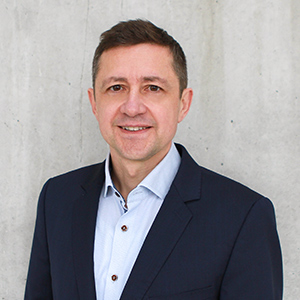
New degree programme: the circular economy in all its facets
Completely new, holistic business models will be needed if we are to become truly climate-neutral. However, companies still lack the skilled workers they need to turn this vision into reality. This is precisely where the new ZHAW Master of Science in Circular Economy Management comes in.
Cycles are a central topic at the ZHAW Institute of Natural Resource Sciences. Water from the sea evaporates, condenses into clouds, falls to the earth as rain, collects to form lakes and rivers and finally flows back into the sea: this is called the water cycle. Leaves fall to the ground, decompose, and release nutrients that are taken up again by the roots of trees and shrubs: this is referred to as the nutrient cycle. “For us, the circular economy has so far primarily meant optimising cycles within processes from a natural science perspective,” says Institute Director Rolf Krebs. “The aspect of economic viability has been more of a downstream consideration.”

“The transition to a circular economy requires solutions that not only make environmental sense, but are also technically feasible and economically attractive.”
The talk coming out of the School of Life Sciences and Facility Management in Wädenswil is also being replicated by other ZHAW departments. Although the topic of the circular economy has become ever more important in recent years, the Schools have until now primarily looked at it from their own standpoint. “However, the transition to a circular economy not only necessitates solutions that make environmental sense, but also solutions that are technically feasible and economically attractive,” emphasises the lecturer in applied soil ecology. And it is precisely for this reason that the new interdisciplinary Master of Science in Circular Economy Management is being introduced. The programme is led by Krebs together with Christian Zipper from the ZHAW School of Engineering and Christian Vögtlin from the ZHAW School of Management and Law.
New laws are driving the shift towards a circular economy
“Saving resources and using energy more efficiently was already an issue at the end of the 1980s,” says Christian Zipper, who teaches in the areas of material and energy flow analyses, life cycle assessments and risk management. He adds, however, that back then what we refer to as the circular economy was only of interest to resource- and energy-intensive sectors such as the steel and cement industries. “Focus was not placed on the environment, but rather on the desire to reduce costs for production and disposal.” Zipper, who obtained his doctorate in environmental science from ETH Zurich, opines that for some years now, against the backdrop of the ubiquitous debate on the consequences of climate change and the consumption of resources, there has been a fundamental increase in awareness within companies that raw materials can and need to be recovered and recycled.

“The EU is at a more advanced stage than Switzerland when it comes to making products more durable, repairable and recyclable.”
It is primarily new laws and regulations that are driving this development. “The circular economy is a major topic – especially within the context of the European Union’s Green Deal,” says Christian Vögtlin, Co-Head of the Center for Corporate Responsibility at the School of Management and Law. The Green Deal bundles together a number of political initiatives with the aim of making all member states climate-neutral by 2050. In Zipper's view, the EU is at a more advanced stage than Switzerland when it comes to decoupling economic growth from resource use and making products more durable, repairable and recyclable.
Fair conditions along the entire supply chain
For example, the “Supply Chain Act”: since the beginning of 2023, large companies in Germany have been obliged not only to guarantee fair, social and environmentally friendly conditions in their own factories, but also along the entire supply chain. Companies that produce office chairs, for example, must ensure that the steel used in the chairs and the cotton integrated in the fabric covers were also produced under humane and sustainable conditions.
The act has a direct impact on an exporting country like Switzerland: Zipper points out that suppliers that produce components for major German companies like Siemens will also have to implement these requirements in the future. “Whether it is a business with several thousand employees or an SME with just ten staff is irrelevant here.”

“Companies that are renowned for their unsustainable practices now face considerably more problems recruiting staff than they did in the past.”
However, this change is not only being driven by legislators and large companies that are more exposed and thus finding themselves under greater pressure and fearing reputational risks. “Today, consumers are also increasingly demanding products that are more durable and can be repaired,” says Vögtlin. Job seekers don't just want any old position, but rather a meaningful activity that they can perform with a clear conscience. “Companies that are renowned for their unsustainable practices, or dirty business if you like, now face considerably more problems recruiting staff than they did in the past.” Last but not least, sustainability is also increasingly becoming a decisive factor for investors.
More experts with holistic knowledge of the circular economy are required
As much as the circular economy is ever more present as an idea in companies, “there is nevertheless a lack of specialists to support them in making the transition,” explains Vögtlin. Of course, many companies already have sustainability officers in place, he adds. “However, even more people who can contribute their transdisciplinary and holistic knowledge of the circular economy are needed.” In addition to technical, economic and scientific skills and knowledge, so-called soft skills are also more in demand than ever before, as pointed out by the business administrator that is qualified as a professor. “The shift towards a circular economy necessitates that we take a critical look at the status quo and rethink it.”
This is precisely where the new ZHAW Master’s degree programme aims to step into the breach. “We want to train professionals who have a broad understanding of what the circular economy is all about,” says Zipper. This means, for example, that students take an in-depth look at natural cycles and address the finite nature of resources. Phosphorus, for instance, says Krebs, is being mined on a large scale, as it is key for the agricultural sector as a fertiliser. “Once the raw material has been used up, there is no alternative waiting in the wings.” Incidentally, Switzerland is a global pioneer in the area of phosphorus recycling: from 2026, it will be required in this country for phosphorus to be extracted from waste water, sewage sludge and sewage sludge ash, and recycled as fertiliser.
The training also includes an overview of different life cycle assessment tools, which also measure a product’s sustainability on the basis of its environmental impact. For example, electric cars are only more climate-friendly than conventional vehicles if the energy in their battery does not come from coal-fired power plants, but rather from hydropower or other renewable sources.
Bike helmets made from fungal material
At the same time, students learn a great deal about material properties and production processes. Zipper explains what this means using the example of a current ZHAW project looking to produce a bike helmet from fungal material. Up-and-coming specialists in the circular economy not only got to know the characteristics of conventional materials and the production methods employed, but rather also about more sustainable alternatives: Do fungi have the same cushioning properties as Styrofoam, or are they perhaps even better? How do you produce a biodegradable bike helmet? Which natural coating technologies are available to help the helmet withstand the rain?
And, last but not least, staying with this example, how do you navigate the journey that ultimately sees such a helmet made from natural materials being worn by cyclists? What are its production costs and what transformation processes does a business have to undertake as part of this project? What standards have to be met and which tests have to be passed? How do you ultimately also make money from a fungi-based helmet? “The sustainability of a product alone is not enough to survive on the market,” Vögtlin points out. “It also has to offer the same level of functionality and quality.”
According to the initiators of the new degree programme, there should be more than enough work for the future graduates: after all, wherever physical products are manufactured, be they hearing aids or smartphones, bike helmets or notepads, a number of things will have to change in the near future.
0 Comments
Be the First to Comment!